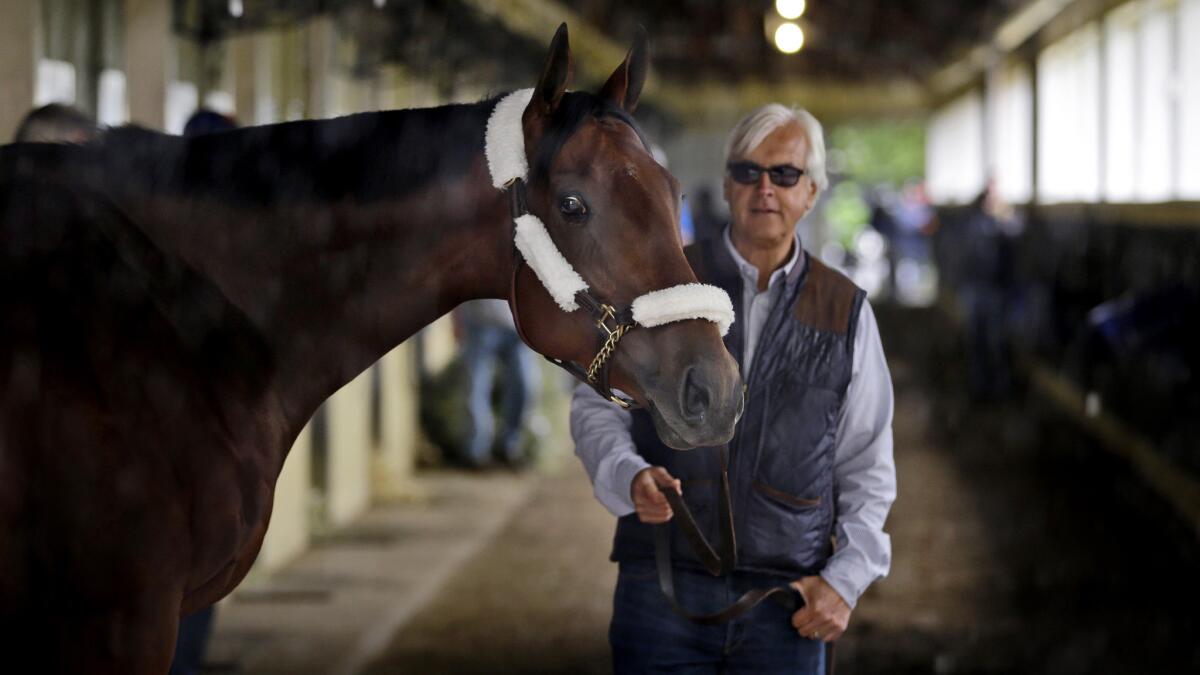Column: American Pharoah looks for a Classic finish at the Breeders’ Cup

Trainer Bob Baffert with American Pharoah at Belmont Park before the Belmont Stakes.
- Share via
From Lexington, Ky. — It is difficult to ponder the human element in the midst of everything Bob Baffert has going for him.
He is the most famous horse trainer in his sport. Recent results would also make the case that he is, currently, the most accomplished.
Baffert is here to saddle his now legendary American Pharoah in Saturday’s Breeders’ Cup Classic. That’s a $5-million race of which Baffert’s take, with a victory, would be around $300,000. American Pharoah won the sport’s first Triple Crown in 37 years, so a Classic victory would push the horse’s career winnings over $8.5 million.
There are 228 horses running in this Friday-Saturday extravaganza, at this Kentucky boutique racetrack, nestled amid miles of green grass and white fences. This is thoroughbred heaven, even when it becomes a giant mud pie from the rainy remnants of Hurricane Patricia, as it was here Wednesday morning.
At stake is $26 million in purses in 13 races. The contestants are all great horses, the cream of the sport’s crop, the best thoroughbred sprinters, closers and cruisers in the world. That includes a contingent of Europe’s best.
But stripped to its basic, there is one story here:
Can American Pharoah complete perhaps the most compelling season in the history of horse racing with the most definitive, and classic, exclamation point? Can Baffert’s Triple Crown hero beat the super mare Beholder, as well as a solid field of eight others, in a race that no less than Hall of Fame jockey Gary Stevens sees as “the best Classic ever.”
Stevens, of course, will be right in the middle of it. He rides Beholder.
This race has even driven the media hype machine into labeling it with one of those record-book, headline-making, public-attention-grabbers: Racing’s Grand Slam. Because the previous Triple Crown winner was Affirmed in 1978, and because the Breeders’ Cup didn’t exist until 1984, this is racing’s inaugural shot at the ultimate career-superlative add-on.
American Pharoah’s Triple Crown, plus a Breeders’ Cup Classic, seems to work nicely into that familiar sports fan lexicon. Baffert resists only in jest.
“I like ‘The Quatro,’ or something like that,” he said. “Grand Slam sounds too much like tennis.”
It also might conjure up images of sport’s most recent run at one — Serena Williams’ crash and burn at the U.S. Open.
Somewhat lost in all of this is that Baffert, in the catbird’s seat to become the biggest winner — or at least the voice of the biggest winner — is also three days from becoming the sport’s biggest loser.
This will be American Pharoah’s last race. He will be off to stud duties, never to return to the Baffert barn at Santa Anita. It is horse racing’s business as usual. Just when the public learns to say hello to a super horse, the horse says goodbye. Huge stud fees make that unavoidable.
We need not feel sorry for Baffert. The rest of the world can only dream of being him. But it is also unfair to overlook the emotional investment that can exist between a trainer and an equine athlete.
“He grabbed me differently than any other horse ever has,” Baffert said. “And that’s well before the Kentucky Derby.”
Baffert admitted that a few of the hundreds of horses he has trained become “like pets.” He talked about American Pharoah in these terms.
“They used to call horses like him ‘hickory,’” Baffert said. “He’s an old-fashioned thoroughbred. Other horses get dull. He never has. Other horses have windows of excellence, like a month or two. He has stayed consistent, solid. He’s shipped all over the country and stayed sharp.”
Baffert is frequently asked when it was that he knew American Pharoah was destined for stardom. He answered that by recalling the race call at this year’s Arkansas Derby, one of the major prep races in which Pharoah proved his mettle.
“Frank Mirahmadi’s call down the stretch,” he said: “‘Victor Espinoza hasn’t asked the question yet, but we all know the answer.’
“Right after that, Jill [Baffert’s wife] said she better buy a dress [for the Kentucky Derby].”
They knew then. The rest of horse racing was pretty sure too. All that had to happen was for American Pharoah, whom Baffert calls a “majestic horse,” to win the way he showed he could.
Mission accomplished.
Baffert said he watches film of American Pharoah’s races just to enjoy them. He claims, and it is almost believable, that Saturday’s race outcome is no huge deal to him. Win and he makes a huge chunk of cash. Lose and he doesn’t.
Either way, that stall at Santa Anita, the one where a camera tracked American Pharoah’s every move 24/7, will be empty when Baffert returns.
Surrounded by reporters and unprompted, Baffert took out his cellphone and showed a picture. It was of American Pharoah’s empty stall — how it looks now and how it will continue to look. Lots of hay and emptiness.
“We won’t put another horse in there, at least for a while,” Baffert said. “I’ve told them to keep it empty.
“I guess there’s a wheelbarrow in there now.”
He faked a smile.
Twitter: @DwyreLATimes
More to Read
Go beyond the scoreboard
Get the latest on L.A.'s teams in the daily Sports Report newsletter.
You may occasionally receive promotional content from the Los Angeles Times.










